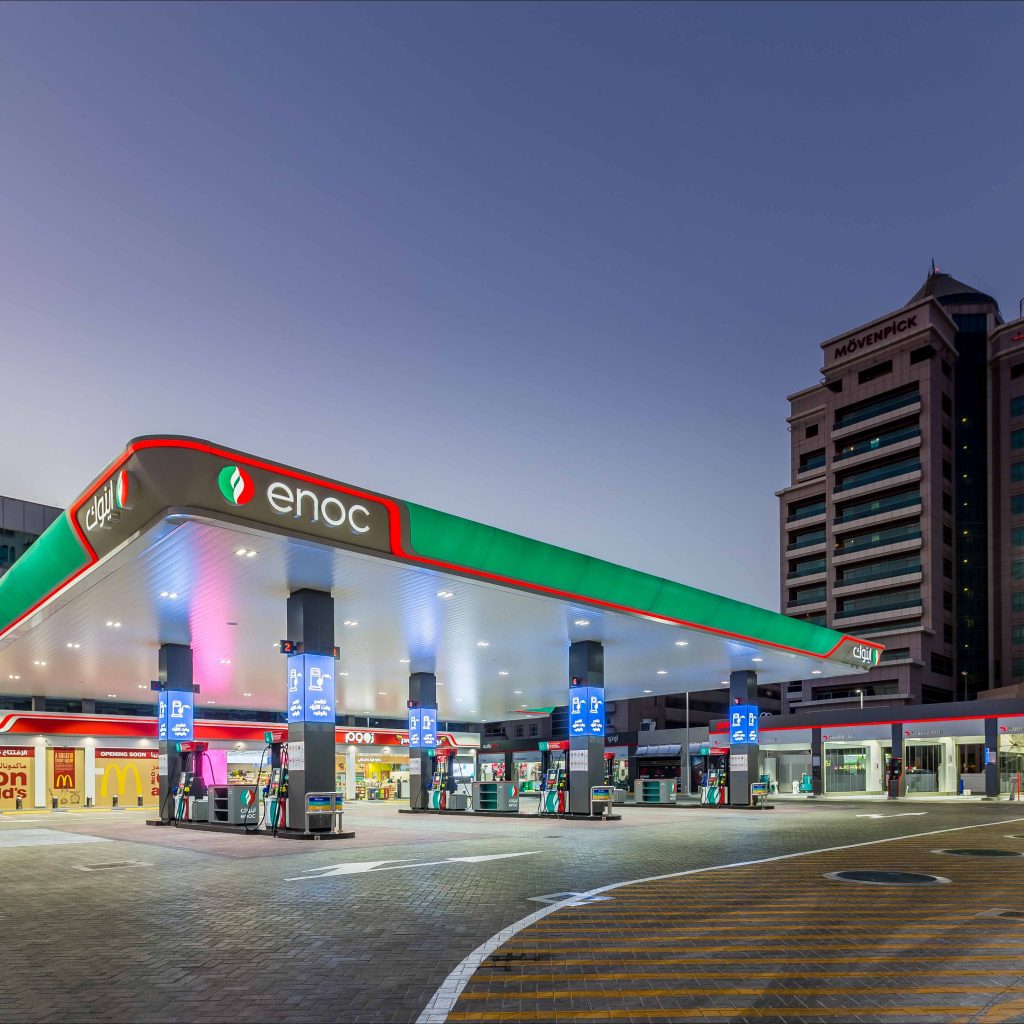November cover story: ENOC Retail and its journey
Skeptics could have never believed that a desert could one day house luxury hotels, shopping malls, and skyscrapers that kissed the skies. Dubai is one of the most technological advanced and modern cities not just regionally but globally. Despite the dry climate and other adverse conditions, Dubai is significantly ahead in terms of economic development, compared to mega-cities of other powerful countries.
The history of Dubai can be divided into two periods: before and after discovery of oil reserves. Prior to the unearthing of oil in Dubai, trade was restricted to dates, camels, and pearls. In 1966, with the uncovering of the first oil reserve Fateh, Dubai was embossed into the world map as an emerging economy. This gradually attracted foreignersboth visitors and residents. Today, Dubai is unrecognisable from its early days.
The Emirates National Oil Company (ENOC) was first established in 1993 by the Dubai government to promote petrol and petroleum products both within and outside Dubai, with the first refinery being set up in 1999. But the ENOC Groups intricate story goes back further than its establishment date.
The company traces its history to 1974, when the earliest subsidiary of the current ENOC Group called CALGAS Bottling Company (which changed its name to Emirates Gas in 1981) was formed to distribute liquefied petroleum gas. The operations of the company were boosted in 1976 when the government established a cylinder factory known as the Cylingas Company. This was followed by the establishment of the Dubai Natural Gas Company (DUGAS) in 1977, which saw the construction of a gas plant that increased the governments production capacity of natural gas. 1980 saw the formation of the Emirates Bunkering and Bitumen Company (EBBCO); they eventually ventured into retail products and changed their name to Emirates Petroleum Products Company (EPPCO) in 1988. These four companies then came together to form the ENOC Group, a wholly-owned Government of Dubai Company.
Over the past 30 years, the ENOC Group has evolved from a local oil and gas player to an integrated global giant with assets and operations across the energy sector value chain. Servicing thousands of customers in over 60 markets, the group employs a workforce of over 10,000 employees and is deploying its world-class customer service, latest innovations and technologies, and best practices to empower the UAEs social and economic development. ENOC has established a solid presence in both the energy business, as well as in related fields and subsidiary enterprises, with business spread over not just in UAE, but also Saudi Arabia, Djibouti, Morocco, Singapore, and Turkmenistan. ENOC manages and operates 116 ENOC and EPPCO service stations in the UAE, reaching an estimated 90 million customers each year.
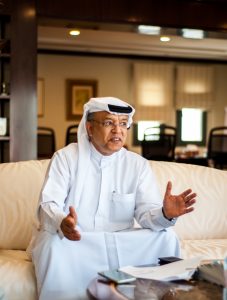
Zaid Alqufaidi, managing director, ENOC Retail
Zaid Alqufaidi, managing director of ENOC Retail comments: We like to call them service stations, not gas stations, because theyre not only selling just gasoline, but are also providing several amenities to the customers. We currently operate 116 service stations across the UAE, 17 of which are in the Northern Emirates. Wed initially announced plans at the end of 2015 to construct 54 additional stations by 2020. So far, weve built 6 stations and have 48 more to go.
ENOC’s highest selling product is Special ULG 95, with retail sales of approximately 1.4 million gallons per day. Fuel deliveries are carried out 24/7, and each site receives two to four deliveries of 10,000 gallons to avoid the risk of interrupting supplies.
Aviation
ENOC has progressively augmented its jet fuel supply infrastructure to support Dubai International Airports growth over the years. In 1998, the first jet fuel pipeline of a capacity of 6,000cbm per day was commissioned, later augmenting the pipeline to 8,800cbm per day. A second pipeline along with a jet fuel terminal was commissioned in 2015 to provide an additional capacity of approximately 18,000cbm per day. With the launch of Dubai South, another pipeline has been planned to feed the new international airport.
Alqufaidi says: ENOC has been delegated to meet the energy needs of the emirate of Dubai. By energy I mean the liquid fuel, which goes into the powerhouses, but most of it actually goes to the aviation industry. Dubai International Airport stands as the highest, and is the number one when it comes to fuel consumption, with more than 83 million passengers recorded in 2016.
Adapting and evolving
Alqufaidi recalls: A few years back I was in His Highness Sheikh Mohammeds majlis, and he threw a question at the audience. He asked: do you know how many bridges are there in Dubai? And all we could think of was Maktoum, Garhoud, and the floating bridge. He then said that they were planning to have 70 bridges in Dubai.
I could not comprehend where the 70 bridges would come from. Because for me, a bridge is the one that runs over water, not the overpasses or flyovers. And naturally, the Dubai Creek isnt that big to accommodate 70 bridges.
But he is a visionary. He knew that hed be building the water canal, and bridges would be passing on top of these. Dubai has transformed today. And the more developments that came about, the more I understood the extent to which this was going to impact our logistics operation, particularly because of the weight restrictions on the bridges.
ENOC runs its own fleet of vehicles, consisting of more than 50 tankers, each of which weigh nearly 14 tonnes when empty. Their weight doubles when filled with the product. Most bridges have restrictions when it comes to weight and height of heavy vehicles, and Zaid Alqufaidi was right: it would certainly impact their business and productivity.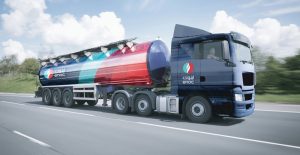
Thats when we took a major decision to convert our fleet from steel tankers to aluminum tankers. And that was the first in the region. We went on to connect with various suppliers from Europe, US, Southeast Asia, and to learn as well, since we have zero experience with aluminum tankers. We came up with a country specification for the UAE and started replacing our existing tankers. We have a replacement policy in our company for all our tankers, once they reach a certain age. Sure enough, today all our fleet is aluminum tankers. And this has brought their weight down to 50%. But the weight was just one aspect of it. It has also made our service more efficient, because were now driving lighter tankers. It has cut down our fuel costs, reduced the wear and tear of the tires. This is something Im really proud of.
ENOC further introduced modifications to its fleet, to further enhance the efficiency and operational safety. Vibrating seats and facial recognition cameras monitor truck drivers to ensure they are not drowsy. Automatic railing on the tanker catwalk ensures that the site-charge can safely check the tanker for excess product, while back cameras and brighter lights guarantee better operation of the vehicle.
ENOC distributes two categories of product white and black. The white product consists of gasoline and diesel, while the black product is the fuel oil and bitumen. The bitumen and the fuel oil is given to a third party to deliver because they require special skills and trucks. Fuel oil goes to the bunkering customers, i.e., the ships, while the bitumen goes to the road contractors.
We believe in that clean package means clean product, says Alqufaidi. As the head of retail, I ensure that our tankers are always clean, because they carry our brand. We have given clear instructions that the trucks need to be washed before they leave the terminals.
I remember we once received a call saying that there was a leak in one of our tankers while they were on the road. But it was actually just the water from the wash theyd just received, splashing off the back of the truck!
Sustainability and innovation
I believe that if you dont innovate, you evaporate, says Alqufaidi. Innovation has always been on the forefront of every process and business that we do, aiming to be creative. As a part of our company policy, were working closely (with the government) to achieve the Dubai plan of a smart, sustainable city.
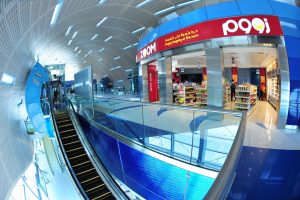 During the Water, Energy, Technology and Environment Exhibition (WETEX) 2017, ENOC announced that all future ENOC service stations will be powered by solar energy to support the UAEs long-term strategy to target an energy mix that combines renewable, nuclear, and clean energy sources to meet the countrys economic requirements and environmental goals. The upcoming 48 stations are slated to be solar powered.
During the Water, Energy, Technology and Environment Exhibition (WETEX) 2017, ENOC announced that all future ENOC service stations will be powered by solar energy to support the UAEs long-term strategy to target an energy mix that combines renewable, nuclear, and clean energy sources to meet the countrys economic requirements and environmental goals. The upcoming 48 stations are slated to be solar powered.
Alqufaidi says: The solar photovoltaic (PV) panels on the roof of the canopy can produce a peak capacity of 120kWh energy on an ideal day, generating approximately 30% more than the average energy required to run the station. The excess power generated is transmitted back to DEWAs main grid through a DEWA solar metre that tracks the power injected to the power grid. This is a significant step in our journey to support the governments vision to cut CO2 emissions by 70% by 2050.
The vapour recovery system installed by ENOC is another step in the right direction for the company. Petrol contains volatile organic compounds (VOCs) that evaporate in storage tanks. During unloading of petrol to an underground storage tank or refueling of a vehicle, petrol vapour in the tank will be displaced by the incoming petrol. Unless controlled, the petrol vapour scatters into the atmosphere. Major harmful effects of VOCs from petrol filling stations include smog, potential health risk to the public as it contains benzene, a carcinogen, and a nuisance to people in the vicinity. A vapour recovery system helps to collect petrol vapour released during unloading and refueling back to the petrol tanker and underground storage tank, respectively. It is expected to convert up to 20,000 litres of fuel.
The service stations utilise LED lights, and variable refrigerant flow (VRF) technology for the air conditioning system, which saves 35 per cent energy as compared to the conventional system. ENOC is also pushing for a hybrid fleet, as well as incorporating the use of compressed natural gas (CNG).
Digitilisation
ENOC offers complete digitalised services at all its refueling stations. These include Vehicle Identification Pass (ViP), cashless and cardless payment facility for refuelling, the PIN-less and paperless debit and credit card transactions at ENOCs service stations, and ENOCPay a service platform that unifies all current and future technologies to allow for easy cardless and cashless payments.
Alqufaidi states: Remember, I dont like to call them gas stations or petrol stations. I like to call them service stations, because today people come to our service stations not to just get fuel, but to procure and buy from our convenience stores, and to avail services such as mobile top-ups, Salik, bill payments, and even purchasing tickets for budget airlines like flydubai.
In a partnership with the Roads and Transport Authority of Dubai (RTA), ENOC announced in September 2017 that customers could now use their NoL cards to pay for all products and services across ENOC’s entire retail network, which includes tap-and-pay for fuel, automotive services, and pay for purchases at ZOOM, Pronto, and Paavo’s Pizza. ENOC has 221 ZOOM outlets that operate across metro stations, ENOC service stations, as well as standalone stores such as those on Sheikh Zayed Road.
Alqufaidi explains: On the retail front, we are mandated to build additional service stations to meet the demand for the future. We know Expo 2020 is just around the corner. Millions of visitors are expected, and nearly 5 million more people are expected to reside in Dubai by 2030. So, there will always be demand for our services. We are continuously building service stations, designing them to be the most efficient and most environment-friendly service stations.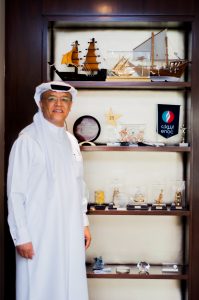
Its been an exciting journey, all these years. Weve seen growth, and weve seen drops. Fuel consumption has dropped in the past few years, a major factor being alternatives such as the metro. So that has taken a lot of our load, and we recognise that.
In September 2017, RTA had announced that the Dubai Metro had crossed the 1 billion rider mark in eight years of service. Furthermore, a contract was signed between Dubai Taxi Corporation (DTC) and RTA for 554 more hybrid taxis, to curb the pollution from vehicle exhausts. By the end of 2017, the DTC targets to increase the proportion of hybrid vehicles to 17% of its taxi fleet.
Alqufaidi remarks: There are a lot of challenges in the businessalternative fuels, electrical or hybrid cars, autonomous vehicles. People say that these things create challenges for our sustainability. Perhaps on the retail aspect of it. But if I look at the holistic and overall view of the ENOC Group, hydrocarbons will always have a need. With us investing in a huge refinery, we can always adjust our business to provide more jet fuel, because there will be growth in that sector. We have already begun collaborations with DEWA, on storing electric chargers in our stations. Once the need arises, we can convert these assets into a service for the cars of the future.
Technology is just unbelievable, and its helping us a lot. Were talking about the fourth industrial revolution, where technology is going to have a serious impact on the way we do things. And I believe that even our industry has gone through that revolution.

